
Ashley Yeager is the associate news editor at Science News. Previously, she worked at The Scientist, where she was an associate editor for nearly three years. She has also worked as a freelance editor and writer, and as a writer at the Simons Foundation, Duke University and the W.M. Keck Observatory. She was the web producer for Science News from 2013 to 2015, and was an intern at the magazine in the summer of 2008. She holds a bachelor’s degree in journalism from the University of Tennessee, Knoxville, and a master’s degree in science writing from MIT. Her book, Bright Galaxies, Dark Matter and Beyond, on the life of astronomer Vera Rubin, will be published by MIT Press in August.

Trustworthy journalism comes at a price.
Scientists and journalists share a core belief in questioning, observing and verifying to reach the truth. Science News reports on crucial research and discovery across science disciplines. We need your financial support to make it happen – every contribution makes a difference.
All Stories by Ashley Yeager
-
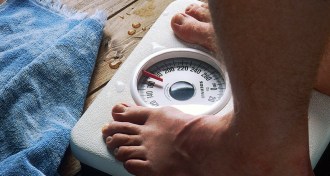 Humans
HumansFather’s obesity linked to autism in children
A father-to-be’s body mass may be a greater risk factor for his child’s development of autism than the body mass of the mother.
-
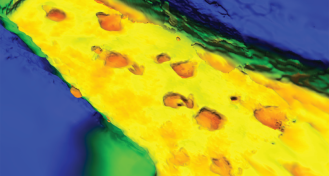 Paleontology
PaleontologyFootprints of dino chase digitally reconstructed
Footprints of a T. rex-type dinosaur chasing an Apatosaurus-like animal have been turned into a 3-D fly-through, giving researchers a way to verify maps of the tracks drawn 70 years ago. (includes video)
-
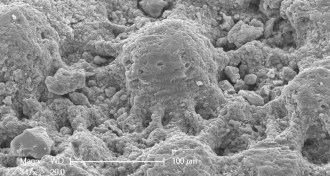 Paleontology
PaleontologySea stars sighted predators 79 million years ago
Sea stars may have evolved complex lenselike structures to detect and evade predators at least 79 million years ago.
-
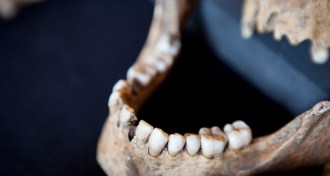 Archaeology
ArchaeologyBlack Death grave reveals secrets of 14th century life
Skeletons dug up by London Crossrail excavations are giving scientists a more detailed look at the bubonic plague, or Black Death, of the 1300s.
-
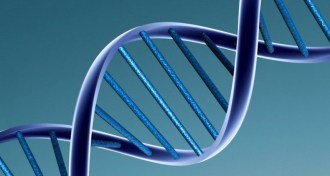 Genetics
GeneticsGene editing reverses liver disorder in mice
By editing a mouse's genes with bacterial proteins, scientists have reversed a rare liver disorder in the animal.
-
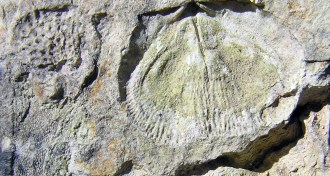 Paleontology
PaleontologyMicrobes indicted in ancient mass extinction
About 252 million years ago an estimated 96 percent of all species were wiped from Earth, and now scientists have a new suspect in the killing — methane-belching microbes.
-
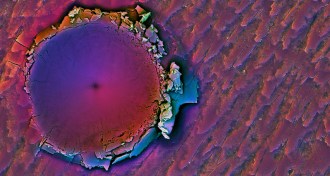 Materials Science
Materials ScienceOyster shells could inspire improved armor
Making tiny indentations in windowpane oyster shells has revealed some processes that could inspire better armor.
-
 Health & Medicine
Health & MedicineBile acids may play lead role in weight-loss surgery
Having more gastric juices swirling around a smaller space and a change in the gut microbiome may be what helps with weight loss after stomach-shrinking surgery.
-
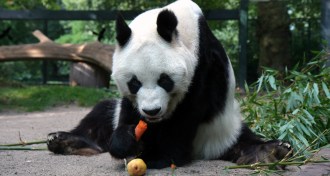 Animals
AnimalsGiant pandas like sweets, but prefer the natural ones
Despite sustaining themselves on bamboo, which isn't very sweet, giant pandas will indulge in a bit of sugar, if they can.
-
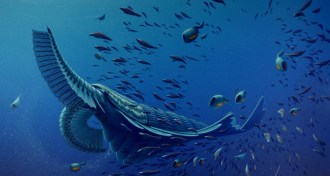 Paleontology
PaleontologyAncient oceans’ top predator was gentle filter feeder
New fossils suggest that a distant relative of lobsters used bristled limbs to net its prey, not spike it.
-
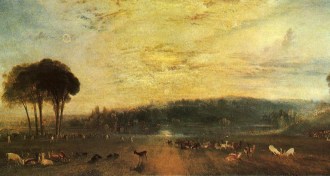 Environment
EnvironmentArtists’ sunsets may reveal past pollution
The colors artists used in the sunsets of their paintings may provide clues to what was circulating in the air hundreds of years ago.
-
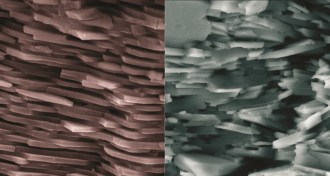 Materials Science
Materials SciencePearl coating inspires tougher ceramics
A material called mother of pearl, or nacre, has inspired the design of more durable, less brittle ceramics.